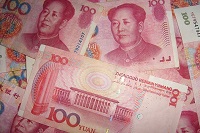 Multinational firms mostly saw downbeat earnings from China in the second quarter and cautiously hoped for better in the rest of the year--but a devaluation of the yuan last week adds a new negative twist.
Multinational firms mostly saw downbeat earnings from China in the second quarter and cautiously hoped for better in the rest of the year--but a devaluation of the yuan last week adds a new negative twist.
The People's Bank of China moved to reset its daily parity rate to the dollar on Tuesday and again on Wednesday and Thursday, shocking markets with a weaker fixing and effectively widening the trading band. The currency is not fully convertible on the capital account and a steady to appreciating narrow trading band has underlain expectations for years.
For multinational drug companies, the weaker currency generally means fewer dollars, euros, kroner, Swiss franc, and even yen, earned equivalent. This dynamic of course plays out across all markets worldwide and chief financial officers take pains to explain hedging to blunt the impact and also to provide comparisons in constant currencies.
However, it can also mean lower costs in-country that are funded by inward flowsto buy supplies and equipment, or pay salaries. For China-based companies there are also costs, as WuXi PharmaTech ($WX) said in its earnings release last week.
 |
| WuXi CEO Ge Li |
"As many of you know, the (yuan) depreciated significantly versus the U.S. dollar earlier this week, and this depreciation could result in significant mark-to-market losses and realized losses on foreign-exchange forward contracts in the third quarter and full year," CEO Ge Li said in the Aug. 13 earnings release. "In addition, WuXi is considering several transactions that in comparison to historical results could further reduce margins and diluted EPS in full-year 2015 and beyond. Therefore, because of uncertainties regarding these circumstances, we are withdrawing our GAAP and non-GAAP diluted EPS financial guidance for full-year 2015."
The next day, the company said it hoped to proceed with a management-led buyout of $3.3 billion, pending approval from shareholders, making the guidance likely irrelevant for investors at this point.
For multinationals listed in the U.S., Europe and elsewhere, the number crunching has likely started in earnest--and with more than a month to go in the third quarter could mean significant changes in working assumptions.
But one sophisticated market watcher in Asia, Marc Faber, publisher of The Gloom, Boom & Doom Report, told CNBC Asia that in the bigger picture, China is moving toward a full-convertible currency and the market adjustment also implied the possibility to currency could strengthen too.
"You have to look at the Chinese currency in the context of all other currencies," Faber told CNBC Asia. "Over the last few years, the yuan has appreciated the dollar and the dollar has appreciated against just about anything in the world," he said, noting the Chinese currency's move is relatively small and appears justified.
The yuan has weakened about 3% the dollar since last week as the People's Bank of China sees the currency out-of-line with economic and market fundamentals, Faber said, a change that does not portend doom.
"The 2% or 3% devaluation of the yuan is completely meaningless," Faber said. "The Chinese yuan has appreciated by 80% over the past two years against the yen."
- here's a story from CNBC
- and the release from WuXi